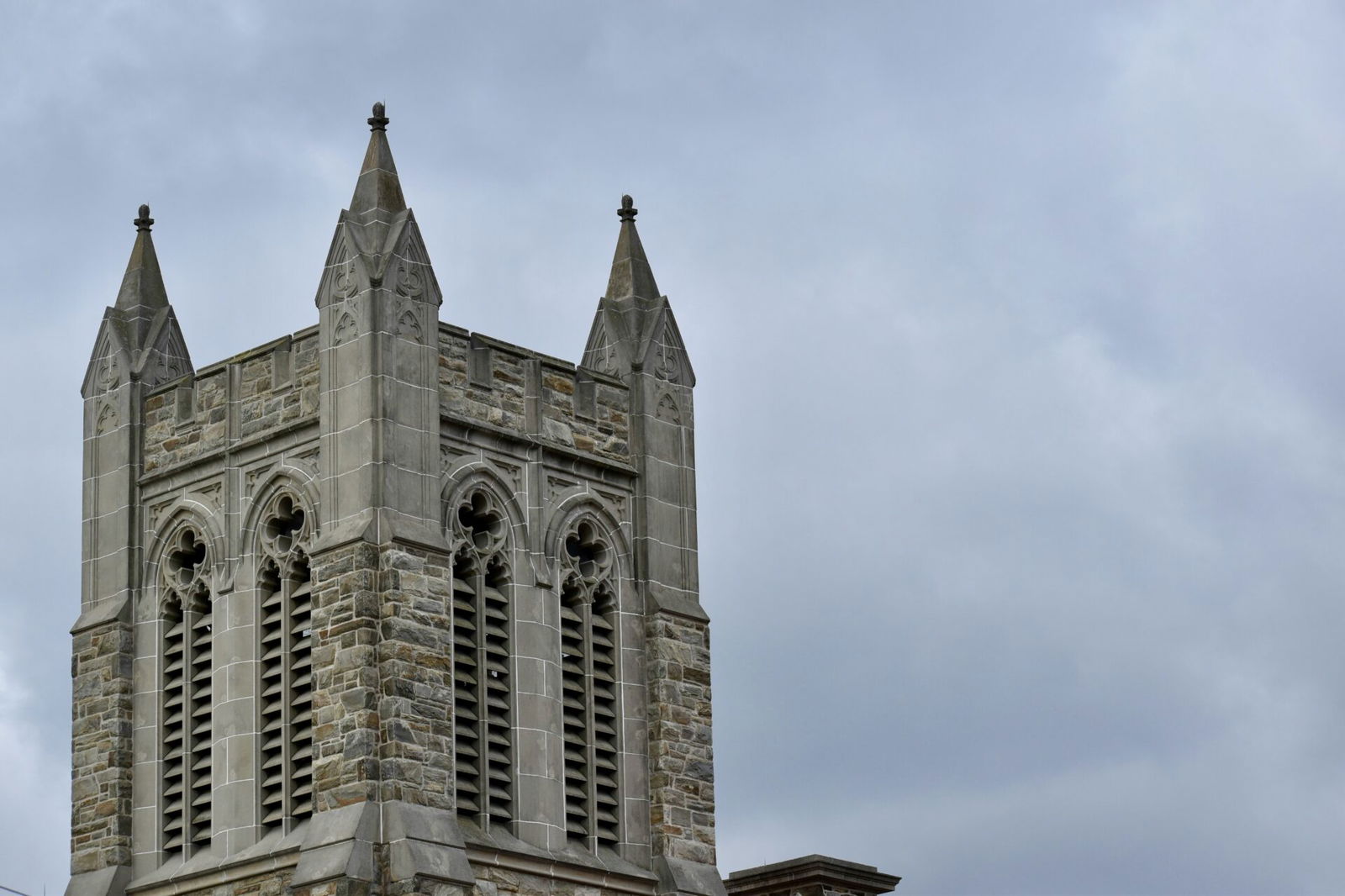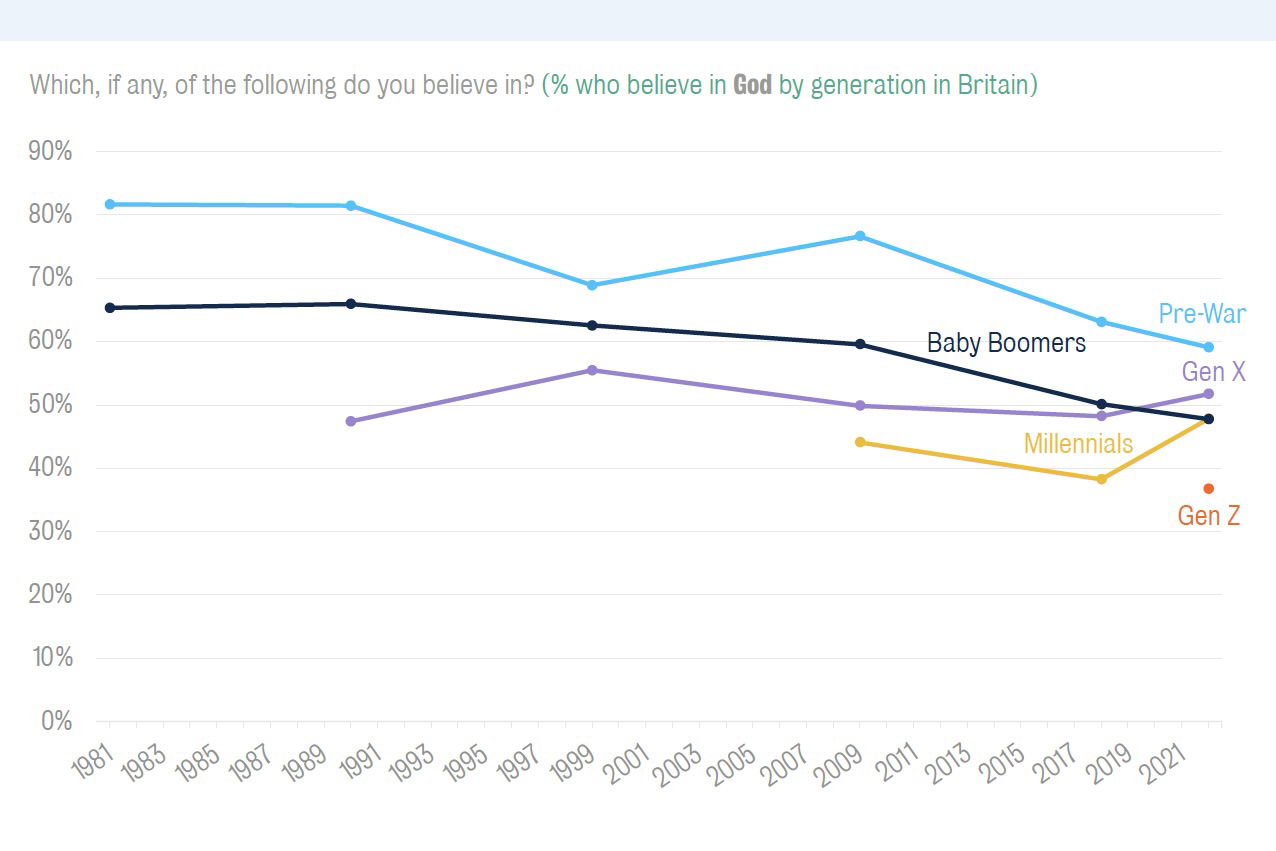





Written by Adam McIlroy.
13 minute read

Over the last few years, there have been a couple of high-profile studies charting the decline of religion in the UK, namely by the Office for National Statistics (ONS) and the Policy Institute of King’s College London (KCL). This decline is one of the factors explaining a decreased preference in the UK for traditional funerals, and a pivot towards modern, personalised alternatives to tradition, by arranging a low-cost funeral. This shift has had a clear impact on British funeral traditions, influencing how people choose to mark death, remembrance, and celebration of life today.
In this article, we want to discuss some of the findings of these studies, asking, among other things, why Christianity is declining in the UK, and what this means for British funeral habits.
Key takeaways:

There are various different factors influencing people’s religious identification in the UK, and recent studies point to quite a broad shift in British social attitudes.
It’s certainly true to say that British Christianity is on the decline, but the picture is a little more complex for religion generally. The recent study by the ONS shows that, for the first time since the collection of census data began, Christians in the UK are no longer in the majority. The biggest demographic increase was seen in those identifying as ‘atheist’ or in having no religion. As far as other religions are concerned, the numbers of both British muslims and Hindus have increased since the last survey in 2011.
According to the ONS survey, as of 2021, 46.2% of the English and Welsh population (27.5 million people) identify as Christian, putting the figure below the 50% mark for the first time ever. On the other hand, those identifying as atheist, or as having no religion, have surged by 12 points to 37.2%, equating to 22.2 million people. The number of British Muslims has increased to 6.5% of the population, which is roughly 4 million people. Hindus have also increased slightly, rising to 1.7% of the British population, or approximately 1 million people.
The statistics generally show that religiosity is declining in the UK, as seen by an increase in the number of non-religious people, and a fall in the number of Christians. That said, the number of Muslims and Hindus has increased despite this trend, so there have been some growth areas in the British populace for religion.
Britain’s religious population hasn’t declined overnight. There are a number of important moments and developments in recent history that have gradually shaped our current attitude.
In the years following the end of the Second World War, much of the world famously went through a demographic change. The ‘baby boomers’ (those born between 1946 and 1964) lived through the cultural revolution of the swinging 60s, and many came of age in those years. In the course of this, they left behind the stauncher religious faith of their parents who’d survived and fought in the war. When they themselves came to have children, they tended not to pass down any religious faith they may have still had.
The children of the baby boomers were more likely to be raised without any specific focus on religion, given that their parents had lived in a different way. The passing down of faith from parent to child turned out to be a crucial element of religion’s ability to remain relevant; without this social habit, Christianity in the UK has witnessed a steep decline. The comparative increase in the numbers of British Muslims and Hindus shows that the habit of children adopting their parents’ religion is still alive and well in those communities.
Beyond the social impact of the 1960s, the popularisation of the internet in the 1990s and social media in the following decades has given everyone access to limitless information. These technologies have provided people with the ability to ask and answer questions like never before, pushing more and more of us from the starting point of a religious world view.
While the number of British people identifying as Christian in the UK has declined, the overall picture is more complex. Interestingly, in the recent studies, a lack of belief in god was not necessarily found to guarantee a lack of belief in the afterlife.
According to the KCL 2022 study on British religiosity, 49% of British people (just under half) say that they believe in god. This is a big decline from the 75% of the population who claimed to do so in a 1981 study. On the basis of this, just under 50% of the British public considers itself to be religious.
Another interesting take-away from the studies is that religious belief across the generations in the UK is not as simple as we might think. Whilst the decline in Christianity is partly explained by the deaths of older Christians combined with a lack of young believers, the KCL study found that the percentage of millennials believing in god has increased. Similarly, the number of generation Xers believing in God has not declined in the same way as the pre-war generation and the baby boomers, remaining more or less constant through the years. Generation Z has the lowest levels of religious belief, at only 37% of the demographic.

From closing churches to dwindling congregations, it’s undeniable that, in some ways, Christianity in the UK is declining.
Around 3500 churches in the UK have closed since 2013, according to the Guardian, and the Church of Scotland is considering closing up to 40% of its churches. These are clear signs that the religion’s relevance is diminishing in Britain.
Despite this, Britain is still ‘literally’ a Christian country, in the sense that the Head of State (King Charles) is also ‘Defender of the Faith’ and head of the Church of England. Bishops can sit, unelected, in the House of Lords. There is no separation of Church and State as is usually found in countries with more modern constitutions, like France and the US. The only other country in the world besides the UK where unelected religious figures can sit in the legislature is Iran.
Despite its decline, Christianity may still have a large amount of cultural and constitutional significance in the UK.
The Covid-19 pandemic has had a lasting impact on attendances at church in the UK. All churches were ordered to close during the first and second lockdowns, forcing worship away from churches themselves and into people’s homes or online. Attendance hasn’t bounced back to the pre-Covid level, with many of the same pressures inflicted upon the working world now also impacting the Church.
Aside from Covid, there have been technological developments and changes in social attitudes that have contributed to the decline of religious belief in the UK.
Many younger people view the moral positions of the church as out of step with their own world view.
It used to be the case that many people would go to church out of a sense of social obligation or respect for one’s parents, even whilst lacking a belief in its teachings. With the passing of the years, people seem to feel less bound by these obligations and more able to live a non-religious life without a sense of guilt or shame.
Britain is now much less racially and culturally homogeneous than it was in the years immediately following the war. With the arrival of more and more people from further afield than Europe, different faiths have found a foothold in British culture. By adding variety into the religious preferences of British people, the dominance of Christianity has partially faded for this reason.
The decline of religion in British society has led to some big cultural changes, including in our funeral practices.
British people are now much less likely to want a religious element in life’s milestones such as weddings or funerals. According to a 2020 ONS study on marriage in England and Wales, only 15% of marriages were religious, meaning the vast majority were civil. The Funeral Guide conducted its own study into funeral habits, and it found that the percentage of funerals which were religious in 2023 was only 17%.
If fewer and fewer people are religious in the UK in their day-to-day lives, it naturally follows that there is less desire for a religious element in life’s most important moments. Many non-religious people in the past may have felt obliged for reasons that they couldn’t explain to have a religious funeral, or at least to have a funeral with a traditional format complete with all of the formal extras, such as pallbearers, a hearse, and a funeral procession with limousines.
To be clear, regardless of whether or not a funeral is religious, it’s still bound to be a profoundly sad occasion. But we are now awakening to the many possibilities of having a non-religious funeral. When we are released from the obligations of traditions we may not hold ourselves, our funeral can be anything we want it to be — whether that means a simple direct cremation, a personalised celebration of life, or even a DIY funeral organised by family and friends. The dress code; words, music, location, and funeral method (e.g., burial or cremation); the presence or not of attendees; and whether the ashes are used creatively afterwards, are all factors which we can personalise to resemble who we were in life, and to tell our story as it was.
Aura offers a low-cost, modern alternative to the traditional funeral through our top-rated direct cremation services. These services are available to those requiring our assistance at short notice, and we provide prepaid funeral plans for those looking to the future. The idea of a direct cremation is that it takes care of the practical matters of the funeral with minimal cost and admin hassle, thereby freeing up the family to arrange any kind of end-of-life celebration they like later on.
Without the focus of the Church in their lives, many people have lost a powerful sense of community. Whether or not you believe in a god, a religious institution like a church is a potent social hub that can help local people to make connections with one another. The decline in church attendance across the UK has coincided with the rise of social media and of online culture; two phenomena that feed off one another, potentially making us more lonely than ever.
The current trends seem set to continue, with gen Z the least religious demographic surveyed by King’s College London. The increase in British Muslims and Hindus aside, the decreasing religiosity of Britain seems set to continue. We live in an age where, more than ever, people want to express themselves, and like to see the self-expression of other people. This has been seen in the changing wedding and funeral habits of British people.
We hope you’ve found this article insightful and interesting. Naturally, if you’ve got any questions about how to arrange your own modern alternative to a traditional funeral, we’re here to help. Our family-run company offers a compassionate, bespoke service that allows you and your family to take care of the practicalities, and focus on what matters. If you’d like to learn more, please get in touch – we’re here to help.


Yes. According to recent studies by the Office for National Statistics and King’s College London, less than half the population now identifies as Christian. At the same time, the number of people identifying as having no religion has grown significantly.
The shift began after the Second World War, particularly with the cultural revolution of the 1960s. Many baby boomers moved away from the religious practices of their parents, and this trend continued as they raised their own children without passing down strong religious beliefs.
Factors include generational change, greater access to information through the internet and social media, the rise of secular values, and changing attitudes toward religion’s role in society. Some also view traditional religious views as out of step with modern thinking.
Not entirely. While Christianity is declining, other religions such as Islam and Hinduism have seen growth in the UK population, largely due to immigration and stronger patterns of passing faith from parents to children in those communities.
Fewer people are choosing religious funerals. In 2023, only 17% of funerals were religious. Many now prefer non-religious or personalised ceremonies, often opting for modern alternatives like direct cremation.
Thousands of churches have closed in the UK since 2013, and attendance has not returned to pre-Covid levels. Although Christianity still has cultural and constitutional influence, actual participation in church life has dropped significantly.
Yes. Younger generations, especially Generation Z, are the least religious according to current data. The overall direction points toward further decline in religious affiliation, with continued growth in non-religious or personalised life events like weddings and funerals.